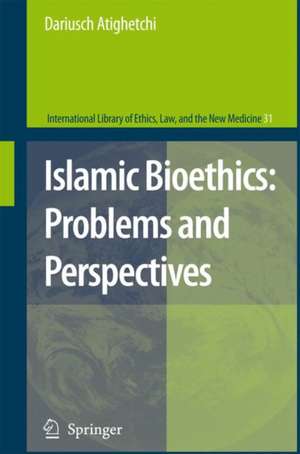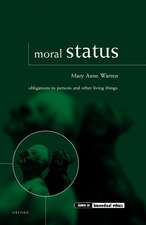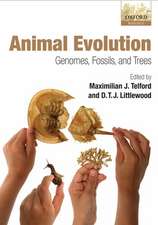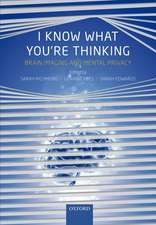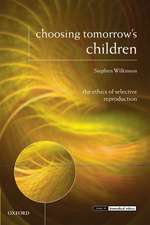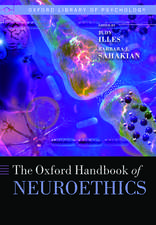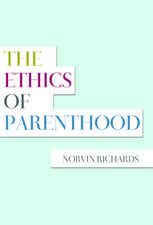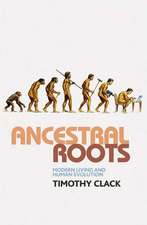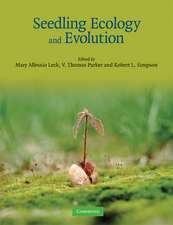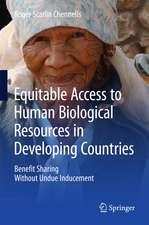Islamic Bioethics: Problems and Perspectives: International Library of Ethics, Law, and the New Medicine, cartea 31
Autor DARIUSCH ATIGHETCHIen Limba Engleză Paperback – dec 2008
The result is a mosaic of positions which are often different (including from the point of view of ethics) but all in pursuit of legitimisation according to the Koran and the Shari’a.
The work has an interdisciplinary approach, drawing on law, sociology, anthropology, politics and the history of science. For this reason it will be of interest to scholars and operators in a wide variety of disciplines and fields.
| Toate formatele și edițiile | Preț | Express |
|---|---|---|
| Paperback (1) | 1221.38 lei 6-8 săpt. | |
| SPRINGER NETHERLANDS – dec 2008 | 1221.38 lei 6-8 săpt. | |
| Hardback (1) | 1227.67 lei 6-8 săpt. | |
| SPRINGER NETHERLANDS – 29 dec 2006 | 1227.67 lei 6-8 săpt. |
Din seria International Library of Ethics, Law, and the New Medicine
- 5%
 Preț: 347.30 lei
Preț: 347.30 lei -
 Preț: 397.26 lei
Preț: 397.26 lei - 15%
 Preț: 635.31 lei
Preț: 635.31 lei - 18%
 Preț: 942.76 lei
Preț: 942.76 lei - 5%
 Preț: 718.65 lei
Preț: 718.65 lei - 15%
 Preț: 634.68 lei
Preț: 634.68 lei - 15%
 Preț: 637.78 lei
Preț: 637.78 lei -
 Preț: 380.07 lei
Preț: 380.07 lei - 18%
 Preț: 959.98 lei
Preț: 959.98 lei - 15%
 Preț: 641.20 lei
Preț: 641.20 lei - 18%
 Preț: 944.19 lei
Preț: 944.19 lei - 15%
 Preț: 636.80 lei
Preț: 636.80 lei - 15%
 Preț: 643.00 lei
Preț: 643.00 lei - 18%
 Preț: 952.89 lei
Preț: 952.89 lei - 15%
 Preț: 643.48 lei
Preț: 643.48 lei - 18%
 Preț: 954.45 lei
Preț: 954.45 lei - 5%
 Preț: 1095.73 lei
Preț: 1095.73 lei - 15%
 Preț: 645.79 lei
Preț: 645.79 lei - 18%
 Preț: 1111.22 lei
Preț: 1111.22 lei - 15%
 Preț: 643.84 lei
Preț: 643.84 lei - 18%
 Preț: 1227.67 lei
Preț: 1227.67 lei - 18%
 Preț: 953.65 lei
Preț: 953.65 lei - 15%
 Preț: 638.57 lei
Preț: 638.57 lei - 5%
 Preț: 1101.21 lei
Preț: 1101.21 lei
Preț: 1221.38 lei
Preț vechi: 1489.49 lei
-18% Nou
Puncte Express: 1832
Preț estimativ în valută:
233.74€ • 243.13$ • 192.97£
233.74€ • 243.13$ • 192.97£
Carte tipărită la comandă
Livrare economică 14-28 aprilie
Preluare comenzi: 021 569.72.76
Specificații
ISBN-13: 9781402096150
ISBN-10: 1402096151
Pagini: 378
Ilustrații: XIV, 378 p.
Dimensiuni: 155 x 235 x 21 mm
Greutate: 0.55 kg
Ediția:2007
Editura: SPRINGER NETHERLANDS
Colecția Springer
Seria International Library of Ethics, Law, and the New Medicine
Locul publicării:Dordrecht, Netherlands
ISBN-10: 1402096151
Pagini: 378
Ilustrații: XIV, 378 p.
Dimensiuni: 155 x 235 x 21 mm
Greutate: 0.55 kg
Ediția:2007
Editura: SPRINGER NETHERLANDS
Colecția Springer
Seria International Library of Ethics, Law, and the New Medicine
Locul publicării:Dordrecht, Netherlands
Public țintă
ResearchCuprins
to Muslim Law.- Features of Islamic Bioethics.- Some Aspects of Medical Ethics.- Contraception and Population Control.- Abortion.- Assisted Procreation.- The Development of Organ Transplants.- Aids.- The Opinions on Genetics.- The End of Life.- Female Genital Mutilation in Specific Muslim Areas.- The Koran and Modern Science.- General Conclusions.
Recenzii
From the reviews:
"‘Islamic Bioethics’ is based on Atighetchis Italian book ‘Islam, musulmani e bioetica’ (Roma: Amando, 2002) but it is considerably enlarged and enriched by additional details. … is not just an overview of Islamic bioethics but also of Atighetchi’s work. … ‘Islamic Bioethics’ is an introduction for a broad audience … . is a valuable introduction to Islamic bioethics and gives a detailed overview not only on the major issues in Islamic bioethics but also on several minor issues." (Nils Fischer, Journal of International Biotechnology Law, Vol. 5 (4), 2008)
"‘Islamic Bioethics’ is based on Atighetchis Italian book ‘Islam, musulmani e bioetica’ (Roma: Amando, 2002) but it is considerably enlarged and enriched by additional details. … is not just an overview of Islamic bioethics but also of Atighetchi’s work. … ‘Islamic Bioethics’ is an introduction for a broad audience … . is a valuable introduction to Islamic bioethics and gives a detailed overview not only on the major issues in Islamic bioethics but also on several minor issues." (Nils Fischer, Journal of International Biotechnology Law, Vol. 5 (4), 2008)
Textul de pe ultima copertă
This book presents a critical analysis of the debate at the religious, legal and political level sparked off by the introduction of new biomedical technologies (cloning, genetics, organ transplants, IVF, etc.) in Muslim countries. It compares the positions of "classic" Muslim law and contemporary religious authorities; laws in Muslim countries; the attitudes and concrete behaviour of populations, families and individuals, as well as the regulations of medical associations, bioethics committees etc..
The result is a mosaic of positions which are often different (including from the point of view of ethics) but all in pursuit of legitimisation according to the Koran and the Shari’a.
The work has an interdisciplinary approach, drawing on law, sociology, anthropology, politics and the history of science. For this reason it will be of interest to scholars and operators in a wide variety of disciplines and fields.
The result is a mosaic of positions which are often different (including from the point of view of ethics) but all in pursuit of legitimisation according to the Koran and the Shari’a.
The work has an interdisciplinary approach, drawing on law, sociology, anthropology, politics and the history of science. For this reason it will be of interest to scholars and operators in a wide variety of disciplines and fields.
Caracteristici
Describes the overall development of the ethical-juridical-social and political debate on new medical technologies in Muslim areas with a problematic and critical approach Compares national laws, the positions of the religious authorities, the attitudes of the populations and actual medical practice Offers an extremely variegated picture of Islamic culture, rich in contrasts and surprises. This variety shows the existence of an Islamic pluralism or of several Islams also on the ethical and bioethical level Responds to the growing interest shown by Western societies in the "culture of Others" Provides health operators (doctors, nurses, specialists), social workers (eg in the field of immigration and social work) and administrative and political authorities with fundamental indications for their relations with Muslim patients A unique analysis of the introduction of new biomedical technologies in Muslim countries A comprehensive, multidisciplinary perspective of current biomedical issues in an Islamic context
